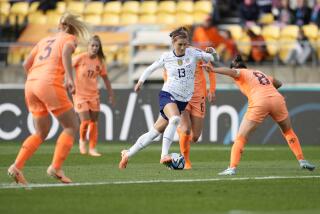Even Beckenbauer Can’t Explain West Germany’s Success
- Share via
QUERETARO, Mexico — Before the start of the World Cup tournament, West Germany’s coach, Franz Beckenbauer, gave his team very little chance at winning the championship.
“With this team,” said Beckenbauer, “we cannot get even close to the world championship.”
Now his team has reached the final against Argentina and “Kaiser Franz,” as Beckenbauer was nicknamed during his playing days at Munich, New York (with the Cosmos) and Hamburg, is groping for an explanation without having to eat his words.
He tries to find it with the same low-key approach that has been his style since taking over the team after the 1984 European Championships. But his temper flares every so often, as it did when he belittled his team during a news conference at Morelia.
Some of Beckenbauer’s players have complained privately about the low-key approach, claiming the secrecy surrounding the lineups in the early stages of the World Cup bothered the team.
“He never told me outright that I will be on the starting 11,” defender Hans-Peter Briegel said. “During breakfast, he just asked me casually whether I felt fit. The game started at noon and so I just packed my gear.”
Beckenbauer should know about the anxieties of the players prior to a match. He participated in three World Cup tournaments as a player, being in the finals twice.
In 1966, he was on the team that lost the memorable overtime final against England, with English star Bobby Charlton playing opposite him.
In 1974, Beckenbauer topped his career by leading the Germans to the the World Cup in Munich, beating the Netherlands in the final.
Was the joy greater then than it would be if West Germany beats Argentina for this Cup?
“The joy here is greater,” Beckenbauer answered when comparing the two tournaments. “In 1974, everybody expected us to win. Here, nobody thought we could pull it off.
“In 1974, the stress was greater because we faced the best team of the tournament in the final. Then, I was much more nervous than I am today. Here in Mexico, we have achieved more than anyone expected by just reaching the final.”
But Beckenbauer, who played a record 103 international games for West Germany before retiring from the national team in 1977, also said there is no difference between winning the Cup as a player or as the manager.
“The title is the ultimate goal, there is no difference whether you are on the pitch yourself or have to sweat it out on the sideline.”
The satisfaction for Beckenbauer surely will be immense, win or lose in the championship game. He labored for months to find the right lineup in a string of preparatory games; went on a limb to persuade flashy Bernd Schuster to join the team--but Schuster refused; and had to bear criticism by the West German press, which contended the former star sweeper had reached his level of incompetence as a coach.
But even if his team takes home the Cup, Beckenbauer will retire after his contract runs out in 1988 following the European Championships, to be played in West Germany.
He is linked to a privately owned television station, one of the first in West Germany, where he is supposed to work as a sportscaster.
And even if he does not turn to journalism, he will be busy with a flock of promotional contracts. “Kaiser Franz” still is an institution in West Germany, and his appeal will increase even more if his team returns as world champions.




